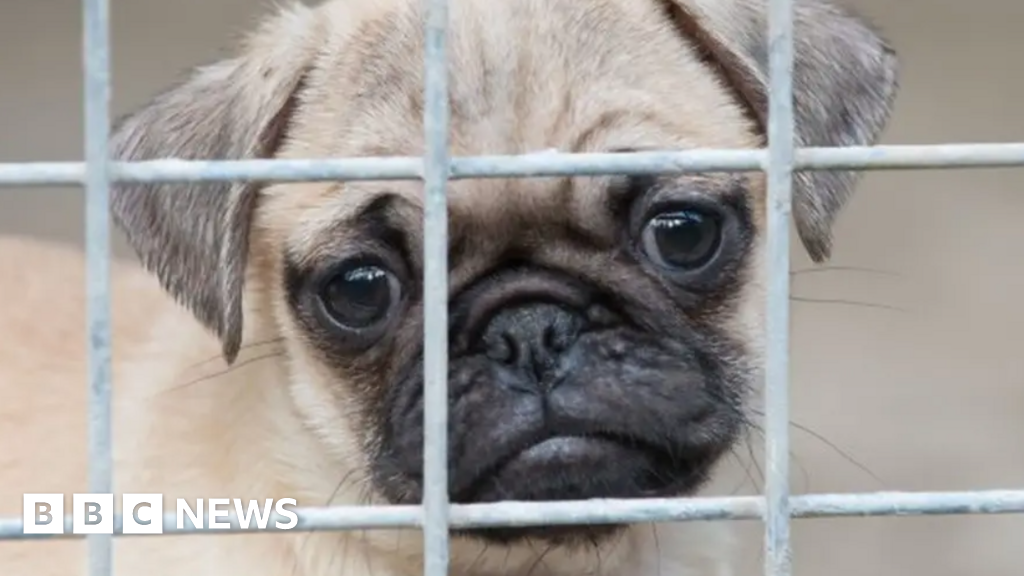Over 1,000 illegally imported puppies in five years have ended up in rehoming centres after being stopped at the British border, new figures suggest.
The Dogs Trust charity said the animals were taken on by its centres after being "illegally landed" at the Channel ports between 2020 and 2024.
The charity hopesa new law that has been proposed, which will be debated in the House of Lords, will help to clamp down on dog and cat smuggling.
The government said new measures would close loopholes exploited by unscrupulous traders.
Campaigners have warned that for a number of years some breeders have brought under age puppies - younger than 15 weeks - into the country, or smuggled in dogs without health certificates.
The Animal and Plant Health Agency (APHA), said "illegally landed" did not necessarily mean smuggled, but referred to any animal which did not meet import requirements and would need to be quarantined under anti-rabies legislation.
Through its Puppy Pilot scheme, Dogs Trust pays for the quarantine costs of dogs seized at the border to aid the interception of illegally imported puppies by APHA.
Once these dogs have been through quarantine, the animal charity then provides care and rehabilitation for them at rehoming centres, prior to them finding their forever homes.
The proposed law would give the government power to stop the import of puppies and kittens that are under six months old.
The Animal Welfare (Import of Dogs, Cats and Ferrets) Bill would also ban the import of dogs and cats beyond 42 days of pregnancy and limit the number of animals that are allowed in a vehicle.
Claire Calder, head of public affairs at Dogs Trust, told BBC South East: "We've seen puppies that are too young, unvaccinated, transported in really terrible conditions and some just don't survive that journey.
"We've tragically seen puppies as young as four weeks old smuggled into the country, or dogs with open wounds from ear cropping and heavily pregnant dogs close to giving birth, so this new bill is incredibly important."
Paula Boyden, a veterinary surgeon, said the pet travel scheme had been exploited for well over a decade, with many thousands of dogs imported for sale.
"In recent years we've also seen an increase in the import of heavily pregnant mums and dogs with mutilations, particularly cropped ears," he said.
Any new legislation needs to be robustly enforced at the border, according to professional dog trainer Ryan O'Meara.
"Passing this law is a good first step, but it has to be backed by proper enforcement," he said.
"We do need clear and practical rules that make it easier for border officials to do their job, whilst still allowing for recognised rescues overseas to responsibly bring their dogs into the UK."
Danny Chambers, vet and Lib Dem MP for Winchester, who put the bill forward, said the illegal smuggling of puppies had long caused serious public health worries that dangerous diseases could be brought back into the UK.
"This bill will curb those concerns – stamping out savage practices that endanger animals everywhere," he said.
The bill will now go to the House of Lords on its route to becoming law.
A Defra spokesperson said: "We were elected on a mandate to introduce the most ambitious plans to improve animal welfare in a generation – and that's why we are supporting this Bill.
"These measures will close loopholes that are cruelly exploited by unscrupulous traders and stop the import of underage, mutilated and heavily pregnant dogs and cats."
Follow BBC Kent onFacebook,X, andInstagram. Send your story ideas [email protected] WhatsApp us on 08081 002250.
Dogs owned by Jose Lopez-Vidal were responsible for the deaths of several sheep, court hears.
Blob is the last of the 23 big cats to be rehomed after their rescue from the Cat Survival Trust.
A woman faces a jail sentence after her three German shepherd cross dogs attacked a woman in Exeter.
A litter of five kittens and their mother are taken into care.
Vanessa Kellow says her dog Poppy experienced "horrendous pain" after being bitten.
Copyright 2025 BBC. All rights reserved.TheBBCisnot responsible for the content of external sites.Read about our approach to external linking.



 Lifestyle
Lifestyle 25 Jul, 2025
25 Jul, 2025 Nimesh Rathod
Nimesh Rathod